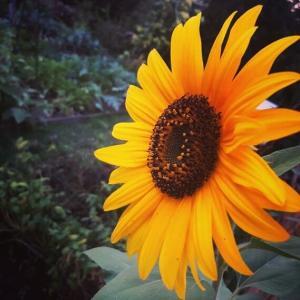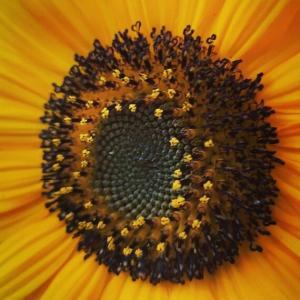Indulging in the beauty that surrounds us, an attitude of mind I personally began grasping when we started living in the unthrifty French countryside, equals the devaluation of size and proportion as definite mainstays of actuality. I’ve always felt pretty uncomfortable about the human inclination to bite off more than one can chew, faking omnipotency, when all one has to do is look around more intently to detect the false materialization of this sham. We giants, bamboozled by our hazardous heights, are but the smallest of wonders in the scheme of things that makes up our fairy tale at Les Pierres.
Being the size that we are, it’s overwhelming to be continuously surpassed by, just one example, the excellent engineering skills of teeny-tiny creatures we were taught to fear because of their ability to sting, an aptness that has blindsided us into ignoring all their many other virtuosities, which they employ seemingly selfless for the purpose of creating their own universes. It becomes pathetically laughable considering how long it took us to acquire knowledge of even the simplest laws of nature, but how easily and thoughtlessly we push that proficiency aside as outdated or non applicable, just because we are big and we reckon we need more space.
Our cautious effort to get rid of this somewhat uncomfortable feeling is to try and take a closer look as often as possible, first and foremost attracted by the beauty of even the smallest particle, and this for sure involves a humiliating humbleness that can make any giant shrink to be as small as a gnome. This is familiar territory, with ‘Eric in the Land of the Insects’ being one of my favorite childhood books of recurring choice, wherein a nine-year-old boy enters the landscape-painting on his bedroom wall and discovers a world of small creatures, stunningly similar to the world of humans.
That childlike sense of wonder is exactly what I regain when staring into our sunflowers, consciously knowing we call them Pseudanthiums, Greek for “false flowers”, because they are not one but actually hundreds of florets, grouped together to form a single flower-like structure. But this consciousness, I’m no longer after.
Stunningly similar to the world of humans
Trying to make ones life sustainable is more than a personal choice and almost automatically leads to a multitude of decisions you have never even thought of before. On this website we share what works for us, or woefully no longer works, obviously without claiming the same for you.
We hope that our journey towards a supplementary comprehensive celebration of nature’s beauty might just clear a pathway forward for you too, perhaps challenges a revealing reconsideration, or simply provides for an equally indispensable diversion.
Can we change the world through food? We believe we can and we support Slow Food, a global movement of local communities and activists across more than 160 countries. Together we defend cultural and biological diversity, promote food education and the transfer of traditional knowledge and skills.



